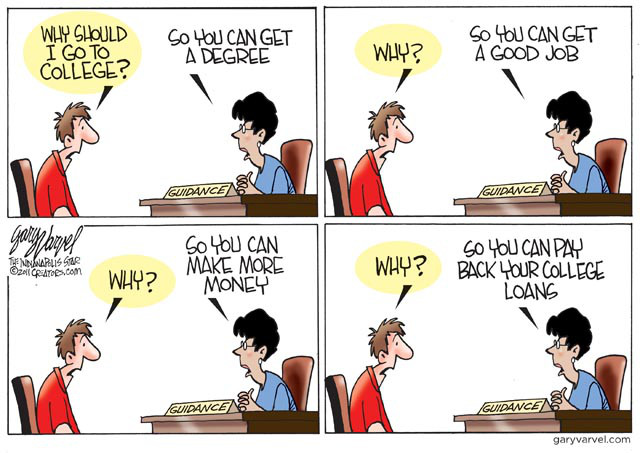In my last post, I discussed the specialization of college degrees and how they take away from a valuable liberal arts education. My main point was that now a days students are going to college for the sole purpose of finding a job, not to expand their mind and learn many new things as it has been in the past. Jenny posed a great question in her comment on my post, proposing that it may have to do with the rising cost of education. This makes sense because students are so worried about their potential debt that they are focused on the getting the best results in the fastest way possible. In the rush to get their degree and head into the workforce, students lose their value of education. I hadn’t thought of the point Jenny brought up so I decided to do some research.
Many of you may have used College Board in high school to research colleges. According to this site, the estimated total value of a Penn State education for an in-state student is $31,720 (one semester!). Then, I found that the estimated total tuition rate for in-state students at the Thomas More College of Liberal Arts is $27,200. That could just be a cheap school so I looked at one more college to compare. The Massachusetts College of Liberal Arts costs $21,096 (even cheaper!) for in-state students.
So what do these numbers mean? To me, they mean that the cost of a true liberal arts education is cheaper than a specialized education for a specific major, such as chemical engineering. However, this poses another question. How valuable is a liberal arts education? What can you do with it? How well do the jobs pay? The cost of tuition doesn’t matter either way if you don’t make enough after college to pay it off. An engineer from Penn State may be in $100,000 of debt but if he can make that in a year then his education was worth all the debt.
An article from pbs.org reflects on whether or not a liberal arts degree is worth the debt that students will face post-graduation. Sal Gentile, the author, begins by noting that people ridiculed the members of the Occupy Wall Street movement for their liberal arts degrees which seemed to hold no significance. Then, the author notes that the governor of Florida cut funding for anthropology because he thinks that people should be more focused on the sciences. One of the arguments is that technology can soon take over the tasks that many people with liberal arts degrees go for. The governor says, “I want that money to go to degrees where people can get jobs in this state.” I disagree with that statement because it is a tough job market for anyone in this economy. If we had millions of engineers and no news anchors (a lucrative career for liberal arts majors!) then there would not be enough jobs for the engineers either. The article comes to the conclusion that it could go both ways: a liberal arts education may be worth it and it may not. There are studies that show engineers make more money but there are also studies that say it balances out in the long run.
I am not sure if anything can be done to bring students back to their childlike sense of wonder about education, but I know that the rising cost will continue to prevent this. What do you think? Do you wish that majors were not so specialized and it was acceptable to explore many different fields? Let me know your thoughts!



